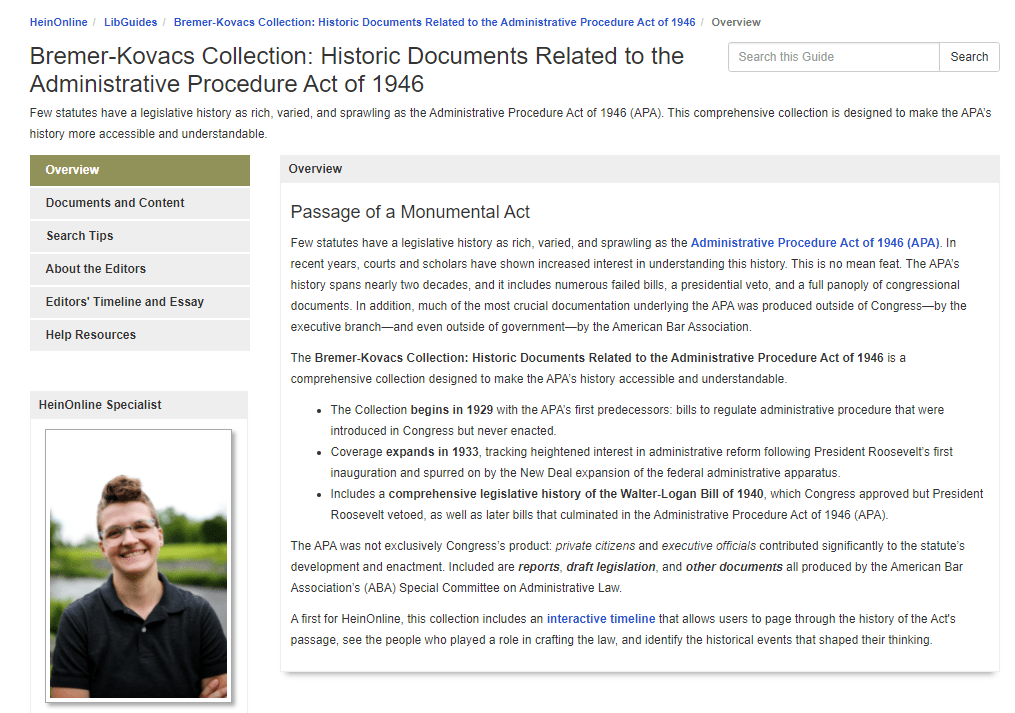We are proud to announce that the Bremer-Kovacs Collection: Historic Documents Related to the Administrative Procedure Act of 1946, a database we unveiled in December 2021, has received the 2022 Joseph L. Andrews Legal Literature Award from the American Association of Law Libraries (AALL). Compiled by Emily S. Bremer, Kathryn E. Kovacs, and Charlotte D. Schneider, this comprehensive database is designed to make the history of the Administrative Procedure Act of 1946 (APA) more accessible and understandable.
This database is included at no additional charge for select Core subscriptions.
About the Joseph L. Andrews Legal Literature Award
AALL’s Joseph L. Andrews Legal Literature Award was established in 1967 in honor of Joseph L. Andrews, the iconic reference librarian (1901-1965). The award is provided to works that, according to AALL, represent “a significant textual contribution to legal literature.”
A variety of formats will be considered so long as the work is significant due to its enduring research value, the result of extensive effort, and/or its impact. Nominations for the Andrews Award shall be measured by the creative, evaluative elements and the extent to which originality and judgment were factors in the formation of the work. The award honors works of legal bibliography, legal research texts, and works that advance the field of law librarianship more generally.
The Bremer-Kovacs Collection was one of two works to receive the 2022 Joseph L. Andrews Legal Literature Award.
About the Bremer-Kovacs Collection
The Bremer-Kovacs Collection: Historic Documents Related to the Administrative Procedure Act of 1946 is a comprehensive database designed to make the APA’s history more accessible and understandable. The Collection begins in 1929 with the APA’s first predecessors: bills to regulate administrative procedure that were introduced in Congress but never enacted. The database’s coverage expands in 1933, tracking heightened interest in administrative reform following President Roosevelt’s first inauguration and spurred on by the New Deal expansion of the federal administrative apparatus. The database includes a comprehensive legislative history of the Walter-Logan Bill of 1940, which Congress approved but President Roosevelt vetoed, as well as later bills that culminated in the Administrative Procedure Act of 1946 (APA).
Works within this database include:
- congressional hearings held on proposed legislation
- treatises written by the men involved in the issue of administrative reform
- reports on administrative agencies
- textbooks written after the APA’s passage
The database is rounded out with various tools to help researchers navigate the database, understand the documents in their rich historical context, and quickly identify the material most relevant to the user’s precise interests. A Timeline charting the Act’s passage is included within the database; access the full, comprehensive timeline prepared by Research Editor Charlotte Schneider here. Additionally, the editors have written an essay that provides a concise narrative of the long road to the APA’s adoption, putting the database’s core documents in their proper historical context along the way.
Additionally, Collection’s editors have combed HeinOnline to locate law review articles discussing, dissecting, and dedicated to the Administrative Procedure Act. Users are able to sort these articles by title or by author. Certain articles with particular relevance to this history of the APA, such as those cited in foundational monographs, hearings, or congressional reports from the time, are annotated in italics.
Editor Spotlight

Kathryn E. Kovacs
Professor Kathryn E. Kovacs teaches Administrative Law, Environmental Law, Natural Resources Law, and Property at Rutgers Law School, the State University of New Jersey. Her scholarship focuses on the Administrative Procedure Act and separation of powers. Prior to joining the Rutgers faculty, she spent twelve years in the U.S. Department of Justice’s Environment and Natural Resources Division, Appellate Section. In 2016, Professor Kovacs served as Senior Advisor to the Director of the Bureau of Land Management in the Department of the Interior. Professor Kovacs also worked for three years as a litigator in the Baltimore City Law Department, and she clerked for the Honorable Robert C. Murphy, former Chief Judge of the Maryland Court of Appeals. Professor Kovacs is a cum laude graduate of Yale University and the Georgetown University Law Center.

Emily S. Bremer
Emily S. Bremer is an associate professor at Notre Dame Law School, where she teaches and writes in the areas of administrative law, regulatory process, and civil procedure. Her scholarship focuses primarily on matters of procedural design, with a recent focus on the history and intellectual foundation of the Administrative Procedure Act. Before moving to legal academia, Professor Bremer served as the Research Chief of the Administrative Conference of the United States (after first joining the agency as an Attorney Advisor), spent three years practicing law in a telecommunications and appellate litigation practice in Washington, DC, and clerked for the Hon. Andrew J. Kleinfeld on the U.S. Court of Appeals for the Ninth Circuit. She is a graduate of New York University and NYU School of Law.

Charlotte D. Schneider
Charlotte D. Schneider is the Head of Public Services at Rutgers Law Library’s Camden location of Rutgers Law School. Ms. Schneider began her information career with the Legal Information Institute (LII) at Cornell Law School and remains as a volunteer virtual reference librarian. Ms. Schneider joined the Rutgers School of Law-Camden Library in July 2012 as a reference librarian, becoming the Government Documents Librarian in 2015 and then the Head of Public Services for the Camden Law Library in 2021. In addition to managing the Law Library’s website and social media presence, she has taught Advanced Legal Research and is a regular guest-lecturer in other first-year and upper-level, as well as undergraduate-seminar, courses.
Bremer-Kovacs Collection LibGuide
Check out this database’s dedicated LibGuide, which explains the breadth of content within the Bremer-Kovacs Collection while exploring how to use the unique, interactive timeline feature of the database that helps users navigate and contextualize the information. Plus, learn more about the editors’ additional bibliography and other help resources.




